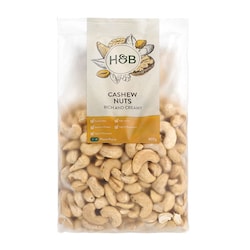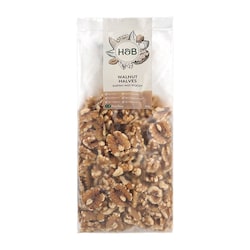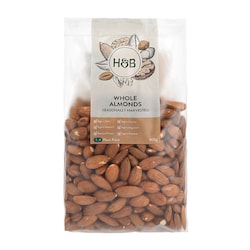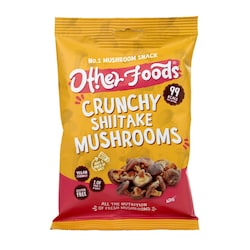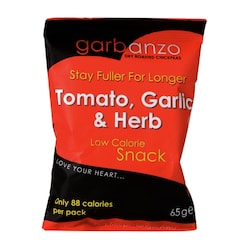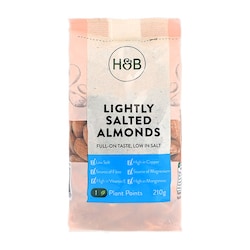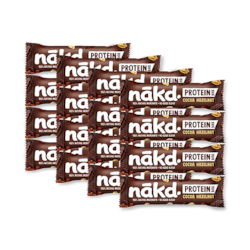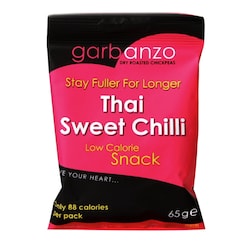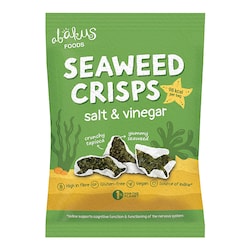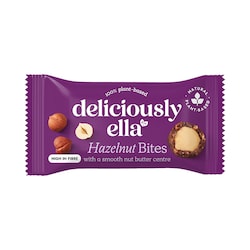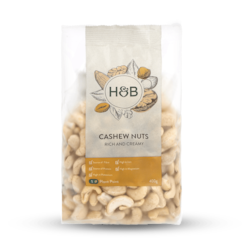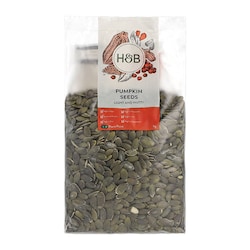20% off £30
Everything you need to know about nutmeg
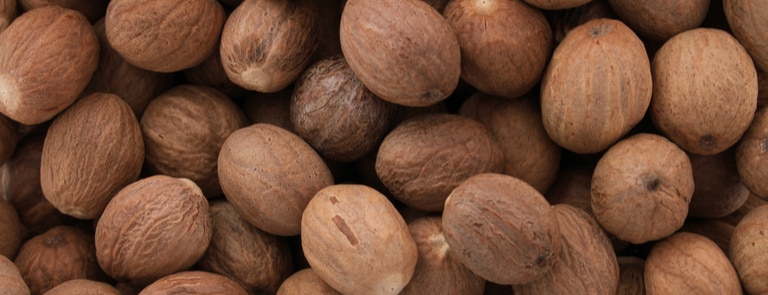
The chances are that you will have tried nutmeg, perhaps in cakes or cookies, chai tea or maybe even a warm cup of eggnog at Christmas.
But the benefits of nutmeg don’t just stop at sweet confectionery and savoury goods. There’s much more to its versatility, and throughout this article, we’ll explain everything you need to know about the popular spice, nutmeg.
What is nutmeg?
Commonly, most of us will recognise grounded nutmeg as a spice. In fact, the nutmeg comes from the Myristica Fragrans, a tropical evergreen tree indigenous to the Banda Islands in the Moluccas (or Spice Islands) of Indonesia.
A brief history lesson
It’s unclear exactly when nutmeg was first discovered, however we do know that as early as the 6th century A.D., nutmeg was traded in the Greek colony, Byzantium which was later known as Constantinople, which we now call Istanbul.
It’s believed that the spice travelled as far as Rome, where it was not only sold as a flavouring but was known more for its health benefits and powers as an aphrodisiac.
What does nutmeg mean?
Quite simply, nutmeg’s meaning, according to the Oxford English dictionary is the hard, aromatic, almost spherical seed of a tropical tree. Though, football fans will recognise this to be the art of deceiving the opposition by knocking the ball between a player’s legs.
However, this popular phrase derives from the nutmeg trade. Because of their origin, nutmegs were seen as an expensive commodity, so devious exporters would try to trick customers by mixing wooden replicas in sacks that were shipped to England. So, nutmegging is simply to trick or deceive the opponent.
What is nutmeg used for?
Nutmeg is one of the most useful spices as it can be used in both sweet and savoury cooking.
It has a variety of aspects that can offer a sweet-sharp, scented or reminiscent taste that could offer black pepper, citrus, tropical and exotic flavours.
What does nutmeg taste like?
Nutmeg has a warming, slightly nutty flavour, which is often used in sweet and savoury cooking, as well as drinks like mulled wine and chai tea.
How to use nutmeg
Nutmeg is generally sold in its ground form. however larger supermarkets may sell whole nutmeg which you can grate yourself at home.
When choosing which nutmeg is best to buy, it's advised that you pick this on sell-by date. Whole nutmeg should not smell, so if you can smell any mustiness then it’s not right.
Summary
- Nutmeg is a spice commonly found in sweet and savoury cooking
- It originates from the Myristica Fragrans, a tropical evergreen tree indigenous to the Banda Islands of Indonesia
- Nutmeg has been known to be around since as early as the 6th century AD
- It was known as an expensive commodity because of its health benefits
Health benefits of nutmeg
As we’ve mentioned, nutmeg is more commonly known for its flavour. However, nutmeg contains a range of powerful compounds that can have an influence on your overall health.
Think we’re nutmegging you? Read on and we’ll provide you with 8 health nutmeg benefits.
6 health benefits of nutmeg
-
Includes powerful antioxidants and microbials
They may be little, but nutmeg seeds are a rich source of plant compounds that act as antioxidants in your body.1
There has been much research into organic antioxidants and antimicrobials from dietary plants as they can safeguard the human body against the oxidative damage of biological macromolecules.2
Nutmeg has been listed as one of those plants to contain antioxidant and antimicrobial properties.
Antioxidants are properties that protect your cells from damage caused by free radicals in the body.
Free radicals are atoms with an uneven number of electrons that can damage cells, which can be counteracted by antioxidants.
-
Spice up your sex life
So, as we touched upon in the brief history lesson – nutmeg was not only sold for its health benefits, but it was also sold as an aphrodisiac.
In fact, Hindus believed that a pinch of nutmeg could improve sexual desire and performance.
While there is no specific human evidence of this, it is widely considered that a bit of spice from nutmeg can improve male libido.3
-
It’s antibacterial
Research suggests that nutmeg oil holds antiseptic properties that can inhibit harmful bacteria.4
While it’s proven that nutmeg oils contain antibacterial properties, more studies are needed to understand whether it can help against bacteria-related oral health issues in humans.5
-
May help various health situations
Animal studies show that taking high-dose nutmeg supplements could support heart health and help maintain blood sugar levels. However, there is no detailed indication that this is the case in humans.
-
A versatile taste
And finally, it's delicious.
Nutmeg is one of the most useful spices in the kitchen. It can be used on its own to add flavour to your mash or can be paired with spices such as cardamom and cinnamon.6
It has a warming, sweet flavour, which is why it goes well with gingerbread, cakes, muffins, and cookies.7
Obviously, it works well in savoury dishes, as well as various warm or cold beverages. Nutmeg spices up a curry as well as it does a mulled wine or cider. You can even put nutmeg in tea.
It’s generally considered an essential addition to the spice rack.
Summary
- Commonly known for its flavour, nutmeg also has many health benefits.
- It has antioxidants and microbials
- It may help the male libido
- Nutmeg has antibacterial properties that defend against harmful bacteria
- It can aid health and is versatile in the kitchen
How does nutmeg help your skin?
As you’ll now know, research into nutmeg shows it to be a powerful anti-microbial, antioxidant, antiseptic, and an anti-bacterial agent capable of reducing free radical damage including in skin cells.
When mixed into a cream, nutmeg reduces inflammation and irritation of the skin while promoting hydration.8
Side effects of nutmeg
When consumed in small doses, nutmeg is unlikely to cause harm to your body. However, large doses could have an adverse effect.
Nutmeg contains two properties called myristicin and safrole, which when ingested in large quantities can cause you to hallucinate and lose muscle coordination.
Myristicin, the main component of nutmeg essential oil is thought to be the drive behind these effects.
How much nutmeg is safe per day?
While there are no specific guidelines on how much nutmeg you should have per day, its recommended that you should not exceed 1 to 2mg a day.9
Studies suggest that toxic reactions occur when taken at 5g and above.10
Is nutmeg safe?
Nutmeg is safe when using it in doses as you’d expect to use in the kitchen. However, when taken in large doses, nutmeg can cause:
- Rapid heartbeat
- Feelings of sickness and vomiting
- Confusion
- Agitation
We would recommend that you use nutmeg for cooking and not for another recreational use.
Conclusion
- Nutmeg is a spice commonly found in sweet and savoury cooking
- It originates from the Myristica Fragrans, a tropical evergreen tree indigenous to the Banda Islands of Indonesia
- Nutmeg has been known to be around since as early as the 6th century AD
- There are a number of health benefits to nutmeg, however many of them require more extensive research
- Nutmeg can be a useful agent for the skin and can be found in skincare products
- Nutmeg is fine when taken in small quantities, however large amounts can be harmful
Last updated: 22 April 2021
- https://www.researchgate.net/publication/264972570/
- https://www.researchgate.net/publication/264972570/
- https://www.ncbi.nlm.nih.gov/pmc/articles/PMC1187868/
- https://www.researchgate.net/publication/322976449_Antibacterial_Activity_of_Nutmeg_Oil
- https://www.researchgate.net/publication/322976449_Antibacterial_Activity_of_Nutmeg_Oil
- https://www.bbcgoodfood.com/glossary/nutmeg-glossary/
- https://www.bbcgoodfood.com/glossary/nutmeg-glossary/
- http://nopr.niscair.res.in/handle/123456789/8121
- https://www.drugs.com/npp/nutmeg.html
- https://www.drugs.com/npp/nutmeg.html


